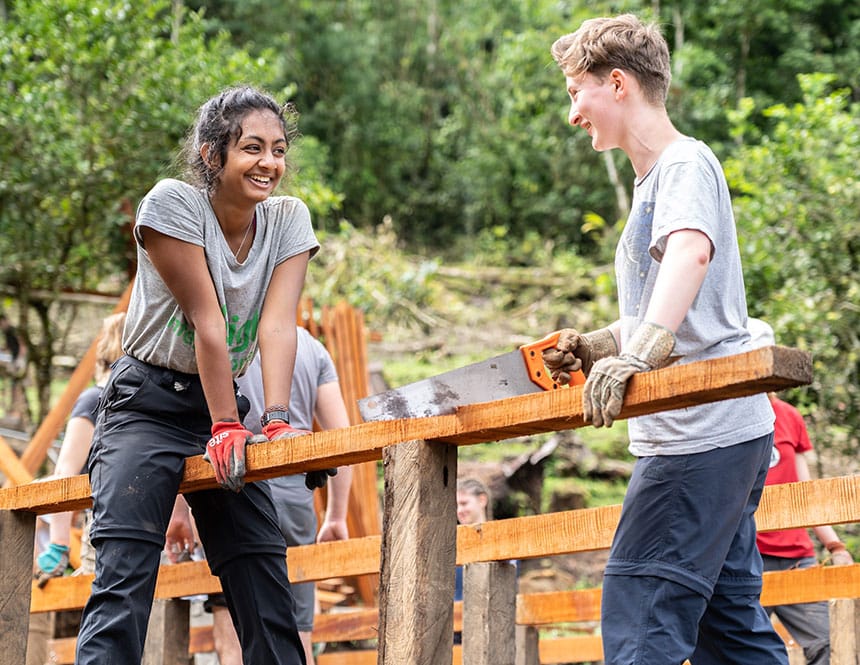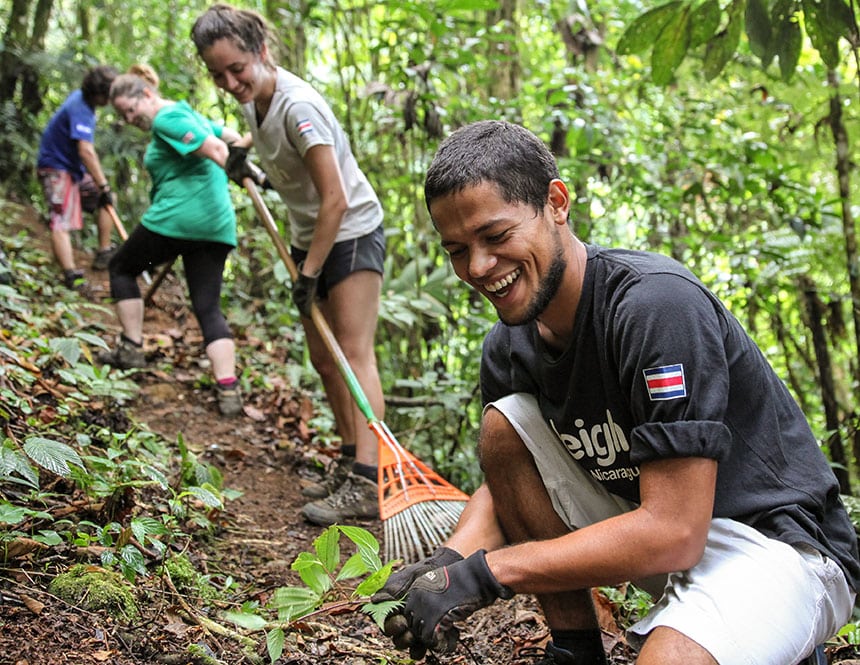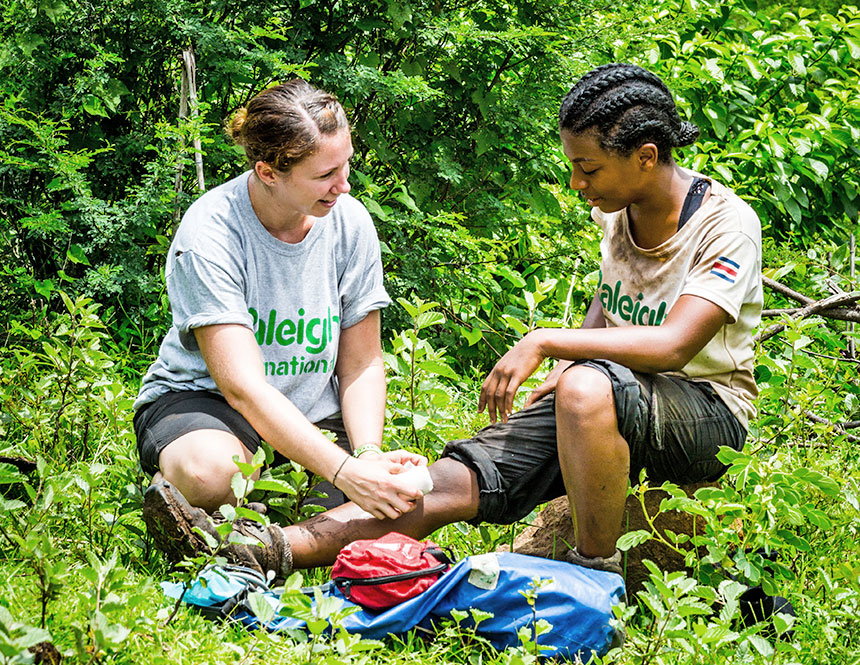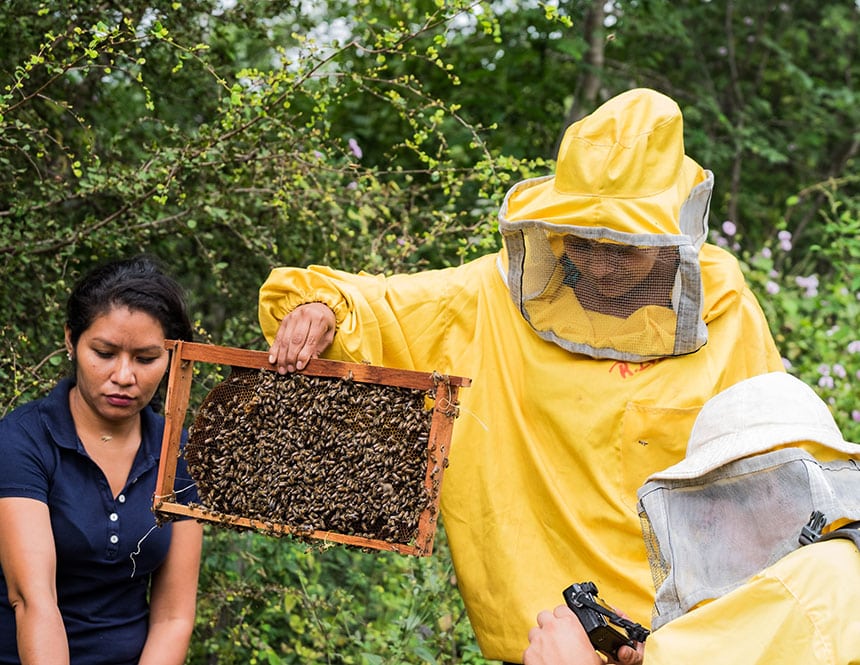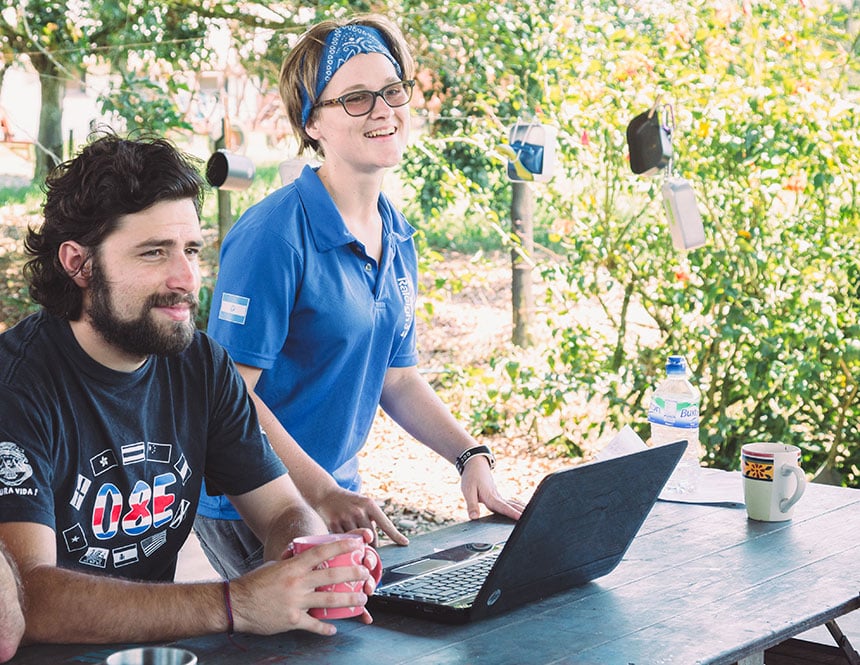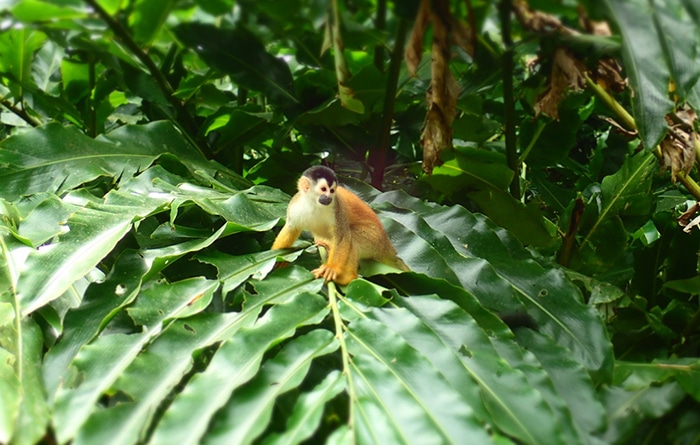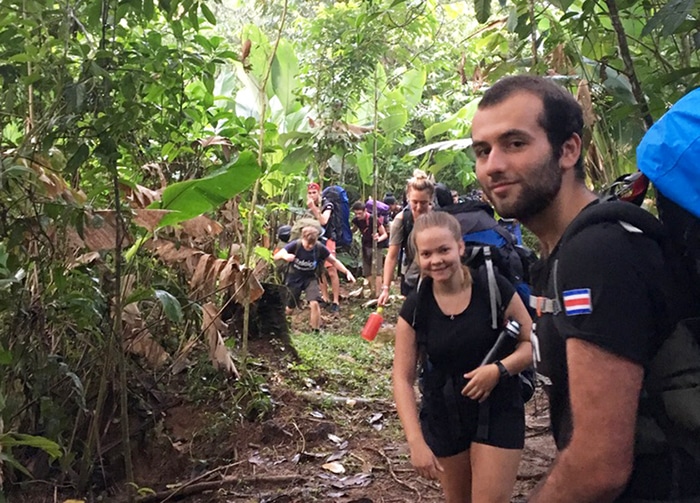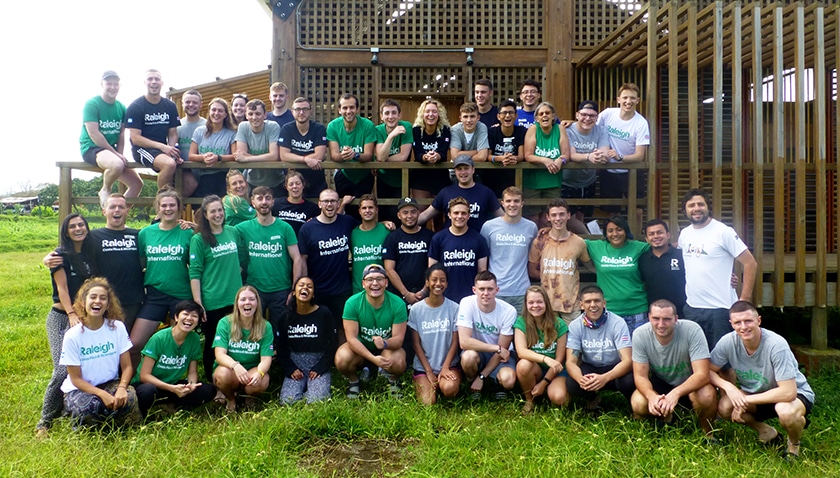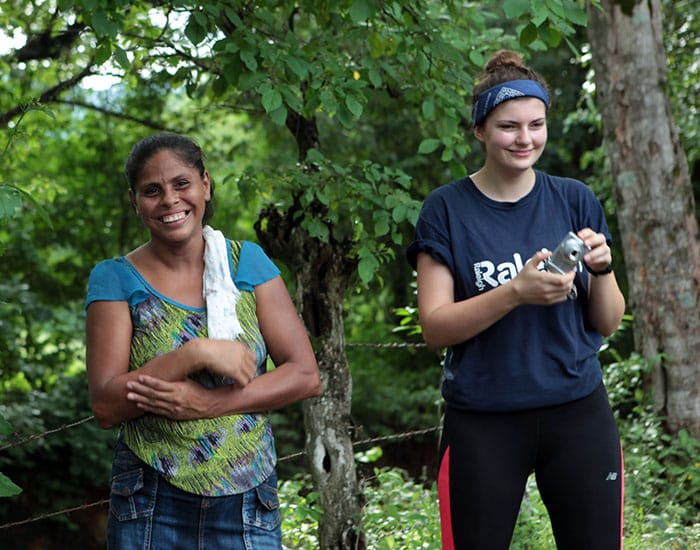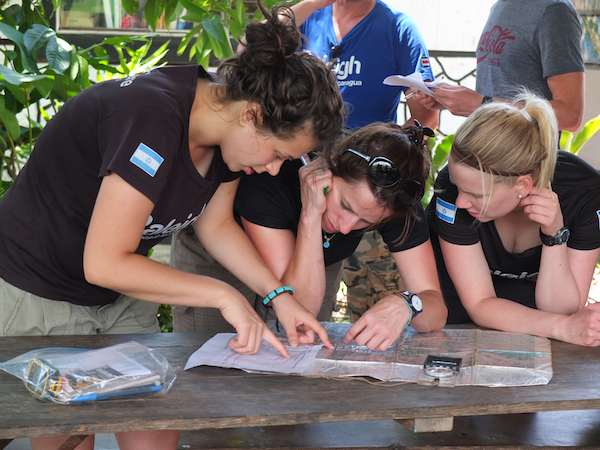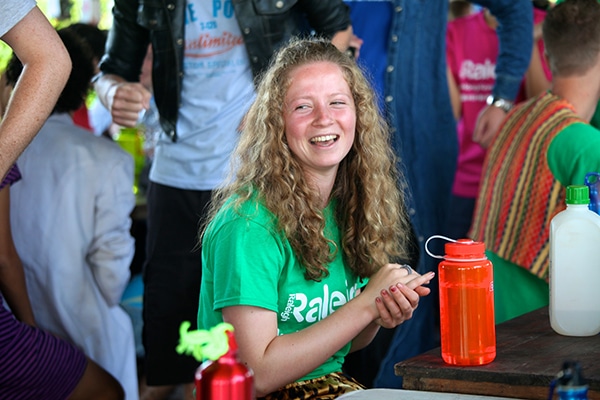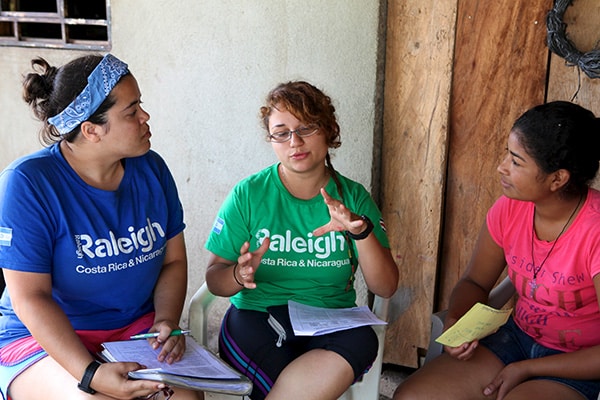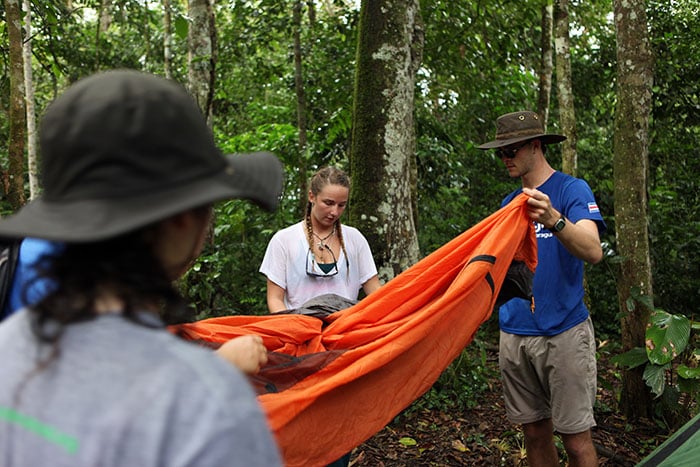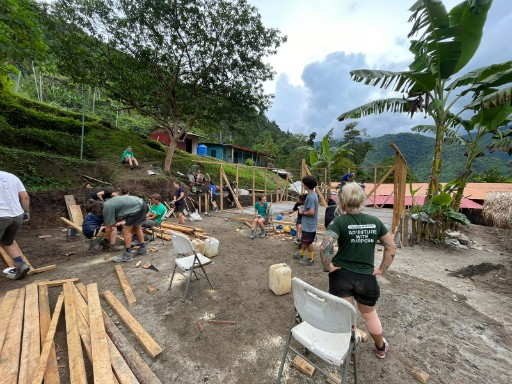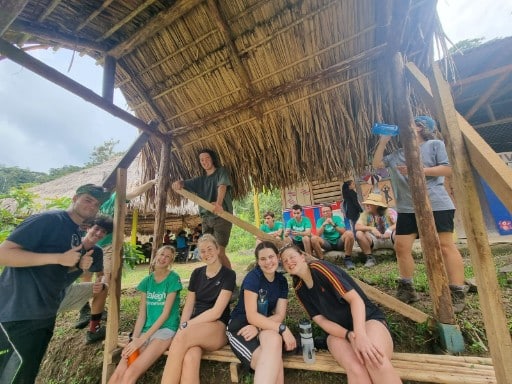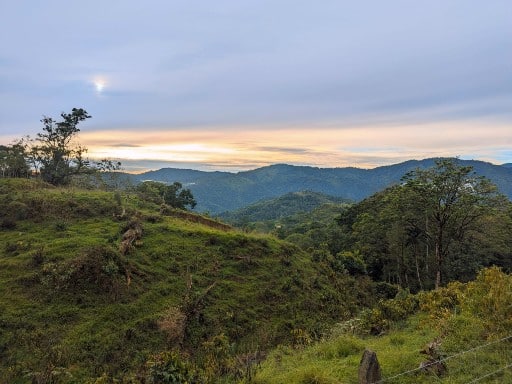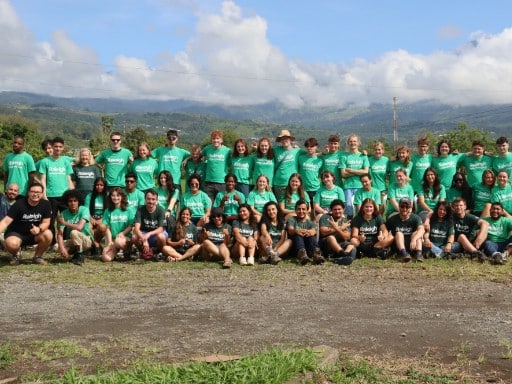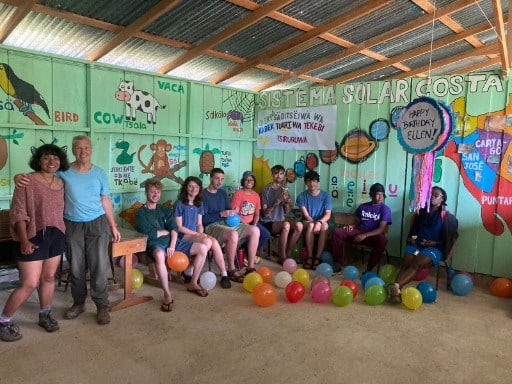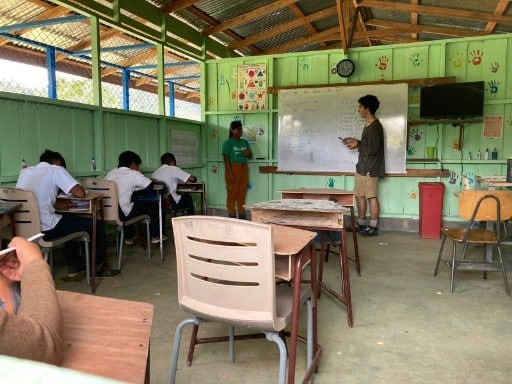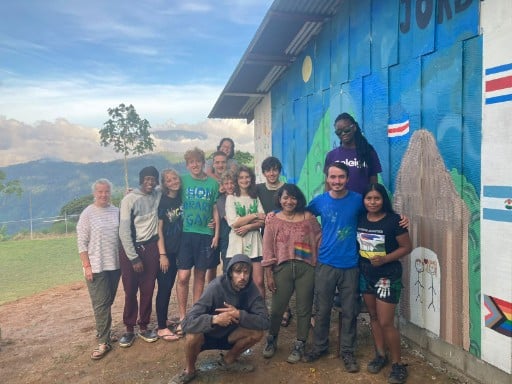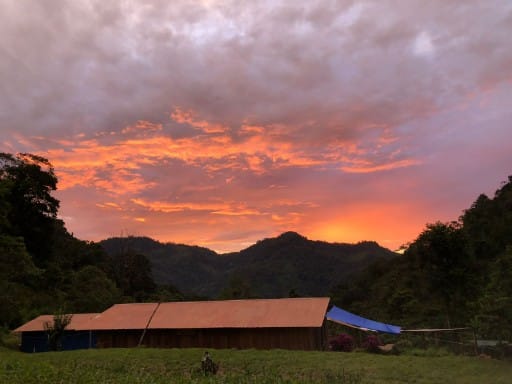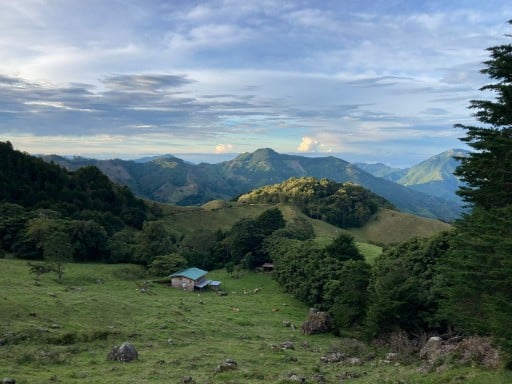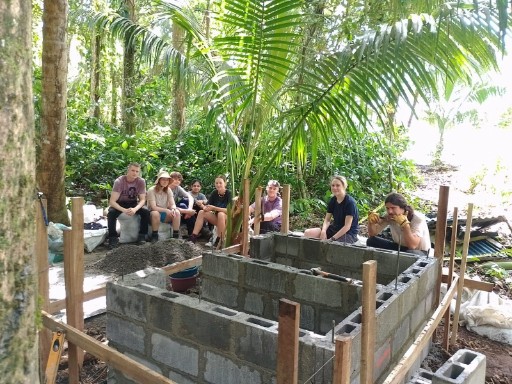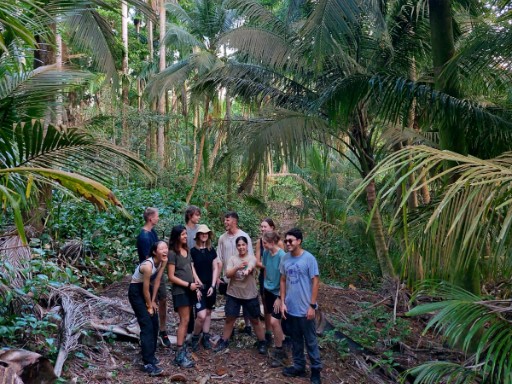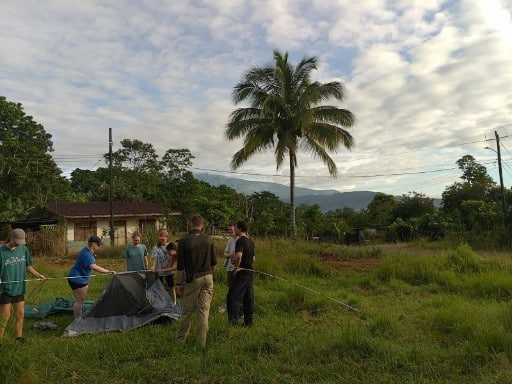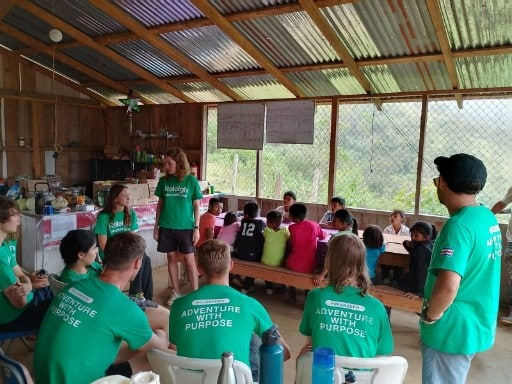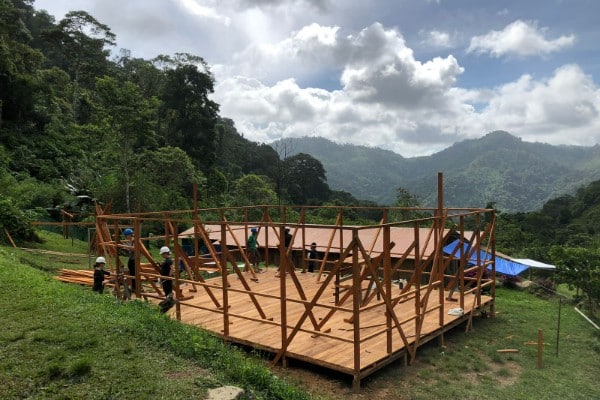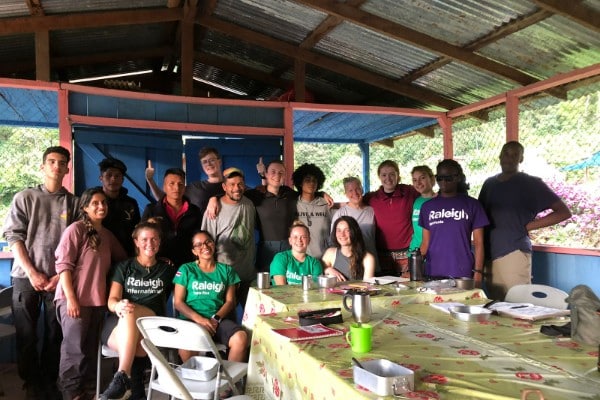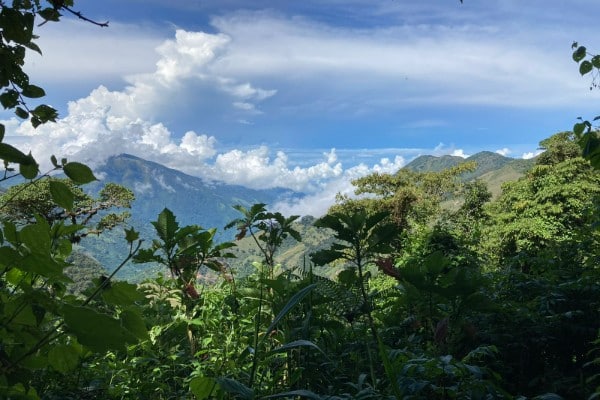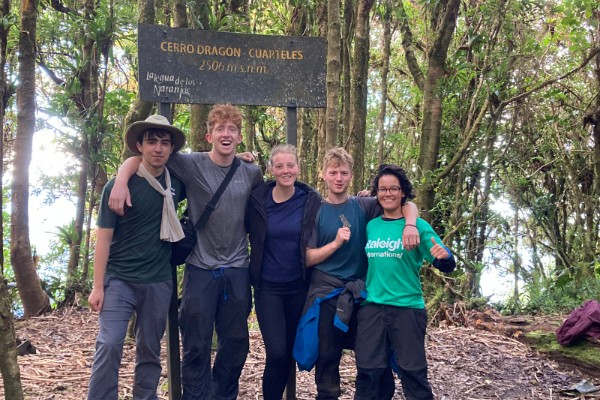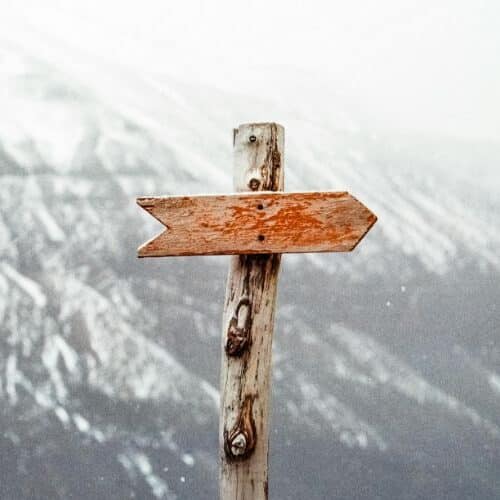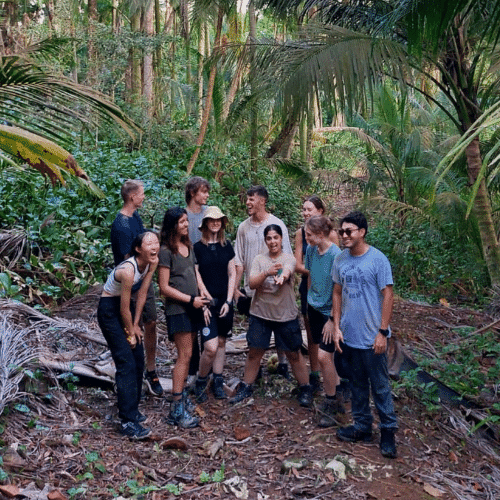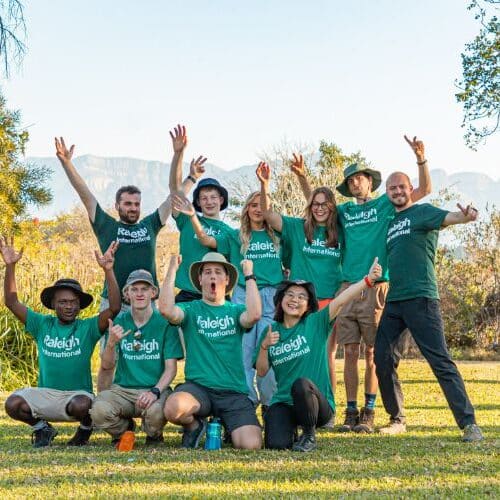Despite making up only 0.03% of the world’s landmass, Costa Rica is home to nearly 5% of the planet’s biodiversity.
INFO
Click here
to sign up to
the next event
Why volunteer in Costa Rica?
It is naturally rich in ecosystems and species; however, many environmental NGOs consider the country’s natural environment fragile and vulnerable.
You will work with park rangers to improve access to national parks (and the private reserves they work with) and volunteer with the innovative young people of Costa Rica to help preserve its natural resources.
In Costa Rica, 2 out of 100 people are indigenous and represent the 2.4% of the population. Indigenous groups in Costa Rica are the most marginalised members of society, largely excluded from the country’s political, social, and economic developments.
Raleigh Expedition connects young people with these communities to work together to tackle their challenges. Through our projects, we aim to increase access to education, raise awareness through campaigns and workshops, and improve access to water and sanitation.
“Raleigh gave me the drive I needed when I was dealing with. Difficult home life and made me determined to raise the money and get on my Expedition.”
Emma | Raleigh Alumni
Projects you can join in Costa Rica
You can get involved in up to 3 phases: Community, Environmental and Trek. For further information of what a 10-week Expedition could look like, download a Guide.
01. Community
Improve access to education in indigenous communities and support young people to develop the tools to prosper in later life.
Raleigh Costa Rica works with indigenous territories who need support to improve the facilities of both primary and secondary schools.
For example, The Alto and Bajo Chirripó Indigenous Territory is one of the most remote areas in Costa Rica. There are low levels of school attendance, high levels of illiteracy, and high levels of poverty. One of the key barriers to culturally appropriate development is a lack of education due to poor facilities and difficult access. Volunteers will work on the construction of school buildings and raising awareness activities with the community on topics such as waste management and climate action.
02. Environmental
Costa Rica boasts an impressive 5% of global biodiversity and has committed to sustainable biodiversity management. Protected areas preserving ecosystems are the foundation of its conservation efforts.
Volunteers are essential in supporting park rangers and aiding in infrastructure maintenance and wildlife research within national parks and private reserves. You will also collaborate with local communities to expand environmental knowledge and conduct workshops on topics like waste management and reforestation. Additionally, volunteers organise community activities to raise awareness and promote action on these crucial environmental issues, which also benefit the local economy.
03. Adventure Leadership
Our Adventure Leadership projects take teams on challenging treks through rainforests and up volcanoes on a variety of stunning routes that tourists don’t get access to.
You could be trekking up to 260 km through the towns and landscapes of Costa Rica that will take you on a journey of personal growth that will continue for the rest of your life. No matter what trekking experience you have, everyone starts and finishes trek together – come rain or shine! Supporting one another, not giving up and sharing your achievements together will be some of the most memorable and defining moments of your Expedition.
What can I expect on my Raleigh Expedition?
Everyone’s Expedition is slightly different – depending on how long you stay when you go and where. This is an outline of what you can expect from a 10-week Expedition. For a more in-depth description of life on a Costa Rica Expedition, including camp life and project info, download your sample itinerary.
Arrive at San José airport
You will be met by the country team
Induction and training (3-4 days)
Get to know your fellow volunteers and prepare for Expedition life. You’ll receive essential training on topics such as health and safety and cultural awareness.
Community Project (19- 21 days)
Volunteers work together on community projects agreed with partners and community leaders. You will be staying in a school classroom which is set up as a bedroom. You will be using all the school facilities (bathrooms, showers, kitchen).
Debrief at base camp (2-3 days)
At the end of each phase, everyone returns to the training centre for a few days before moving on to your next project. You’ll catch up with the rest of the Expedition team and start to prepare for your next project. Project groups will change between each phase, this is an important part of the Expedition experience.
Adventure Leadership Project (19 – 21 days)
On this trek, every day is different, including the weather and the accommodation. Go from camping on top of a mountain and sleeping under the stars to camping in a community centre.
Environmental Project (19 – 21 days)
Volunteers will support the maintenance and conservation of existing ecosystems and assist local communities to preserve such a biodiverse nature.
Final review at base (2 days)
All Expeditions end with everyone coming together for a final few days back at the training centre. Catch up with friends and celebrate all you have achieved together.
Costa Rica Expedition gallery
Expedition Schedules & Pricing
We run three cycles every year. You can choose between different Expedition lengths:
10-weeks: The most immersive and popular Expedition. Take part in all three full phases.
7 weeks: Take part in two full phases. You’ll be assigned either the Community or Environmental project with the Adventure Leadership Trek.
4 weeks: Take part in a full phase of a Community Project or Environmental Project (assigned) with a shorter 5-day trek.
2024 Expedition Dates
FEBRUARY - APRIL
10 Weeks
12th February – 18th April 2024 – FULL
£4,395$5,970$5,570$5,570
NOW FULLY BOOKED
7 Weeks
A: 12th February – 29th March 2024 – FULL
B: 4th March – 18th April 2024 – FULL
£3,930$5,380$4,980$4,980
NOW FULLY BOOKED
JUNE - AUGUST
10 Weeks
24th June – 29 August 2024
£4,395$5,970$5,570$5,570
LIMITED SPACES
Application deadline: 5th May 2024
7 Weeks
A: 24th June – 9th August 2024
B: 14th July – 29th August 2024
£3,930$5,380$4,980$4,980
LIMITED SPACES
7A Application deadline: 5th May 2024
7B Application deadline: 16th June 2024
4 Weeks
A: 24th June – 22nd July 2024
B: 25th July – 22nd August 2024
£2,585$3,680$3,280$3,280
4A FULLY BOOKED
4B LIMITED SPACES. Application deadline: 27th June 2024
OCTOBER - DECEMBER
10 Weeks
8th October – 13th December 2024
£4,395$5,970$5,570$5,570
7 Weeks
A: 8th October – 23rd November 2024
B: 28th October – 13th December 2024
£3,930$5,380$4,980$4,980
Application deadline: 31st July 2024 (7B – 15th August 2024)
2025 Expedition Dates
FEBRUARY - APRIL
10 Weeks
10th February – 17th April 2025
£4,395$5,970$5,570$5,570
7 Weeks
A: 10th February – 28th March 2025
B: 2nd March – 17th April 2025
£3,930$5,380$4,980$4,980
JUNE - AUGUST
10 Weeks
24th June – 29 August 2025
£4,395$5,970$5,570$5,570
7 Weeks
A: 24th June – 9th August 2025
B: 14th July – 29th August 2025
£3,930$5,380$4,980$4,980
4 Weeks
A: 24th June – 22nd July 2025
B: 25th July – 22nd August 2025
£2,585$3,680$3,280$3,280
OCTOBER - DECEMBER
10 Weeks
11th October – 16th December 2025
£4,395$5,970$5,570$5,570
7 Weeks
A: 11th October – 25th November 2025
B: 31st October – 16th December 2025
£3,930$5,380$4,980$4,980
What’s included
- Airport welcome and transfers
- All food, transport and accommodation in Expedition country
- 24-hour support from Expedition country office and UK staff
- Safety expertise
- Extensive pre-departure information and support
- Local orientation, project training & equipment
- Exclusive kit discounts & advice
- Raleigh t-shirt
Not Included
- Flights
- Visas
- Vaccinations
- Personal kit
- Travel insurance
A full breakdown of whats included and not included along with a welcome pack to help you prepare will be provided on application.
Costa Rica has a naturally rich ecosystems but it's fragile and vulnerable.
How to apply
Apply online
Fill in your online application form and tell us why you want to go on Expedition!
Screening
If your application is successful, we send you a booking form and ask for more information and process a deposit of £200$200$200$200
Confirmation
You will be assigned a volunteer coordinator who will send you all the information you need about your Raleigh Expedition.
Pre-departure
Get ready for your Expedition – we will support you all the way!
Over 25 and looking for a Volunteer manager role?
Our Volunteer Managers (VM) are the driving force behind the Expedition and are vital to ensuring the programmes run smoothly and effectively. You can apply for these roles on the main application page.
The Raleigh Impact
Over the years Raleigh has made some significant impacts on communities, the environment and people
The on-the-ground team
Here are some of the Raleigh Costa Rica team who will be looking after you
Ignacio (Nacho), Country Director
Nacho is an Environmental Lawyer and Sustainability Project manager with experience in advising on public policy design and implementation in areas such as climate change, human rights, indigenous peoples, transparency and environmental conservation. As well he has worked in the promotion of ecotourism, sustainable rural development and wellness tourism. He has previously worked with Rustic Pathways in developing project impact best practices and sustainability practices for the company’s operation. His status as a Raleigh Alumni underscores his wealth of experience, making him well-equipped to lead and advance our presence in Latin America And direct operations in CR.
Osman, Operations Manager
Génecis, Operations Coordinator
Génecis leads Raleigh’s environmental projects, Latino volunteers’ recruitment, as well as overseeing the day-to-day logistics and health and safety of Raleigh volunteers during Expedition. Génecis is a Venezuelan migrant and geographer.
What makes Raleigh Expeditions unique?
Volunteering with Raleigh International is an immersive, one-of-a-kind experience. Described by our volunteers as “absolutely life-changing”, it’s a journey you will never forget. Don’t expect tourist hotspots, five-star hotels and 24/7 wifi (we are all about the digital and alcohol detox); instead, expect a memory-making adventure full of fun, rewarding experiences and real world connection.
Be with people your age
Apart from team leaders and staff, you will be grouped with people aged 17-24. This is unique to Raleigh.
A community environment like no other
We're no phones programme so you can share the experience fully with the same group during your trip. Learn to support each other and make friends for life.
Varied experiences
You will have the opportunity to take part in up to three phases contributing to community and environmental projects allowing you to gain more skills and experiences.
Diverse and Inclusive
Volunteers join diverse teams of young people from across the globe as well as volunteers from the country you are based in.
Real adventure
We're booze-free and adventure filled. Raleigh Expedition is an exciting and fun experience that will push you out of your comfort zone (in a safe environment!).
Future ready
Gain the skills, confidence and perspective to play a leading role in building a better and more sustainable world for everyone.
Need more information about Expedition?
Consultation call
Whether you have a specific question or want to discuss which Expedition is right for you, schedule a call with a member of the team at a time convenient to you.
Join an info event
On our monthly online info events, we’ll tell you all about Expedition. Have your questions answered, meet other volunteers and find out what Expedition is really like from an alumni.
Download a guide
Find out all about Raleigh International and Expedition in our helpful information guide.
What our Raleigh volunteers say
Hear from our past Raleigh alumni's life changing experiences
Nacional de Costa Rica y quieres ser voluntario?
Costa Rica Expedition FAQs
Frequently asked questions about Raleigh Expedition in our Costa Rica locations
Will I need to do any training before I arrive?
All volunteers are invited to attend a Pre-Expedition Training Event to meet other volunteers and here more about Expedition.
We recommend you learn as much Spanish as you can before you come; this will make communicating with members of the community and partner organisations easier. We also recommend practising hiking in preparation for the trek, but this is not necessary.
What sort of food will I be eating?
Raleigh provides dry and fresh food, and volunteers rotate to cook for the group. The staple food in Costa Rica is rice and beans, which can be accompanied by different vegetables and proteins. Tropical fruits are delicious and very sweet, and we eat them frequently.
How far in advance should I book?
We recommend you reserve your place between 5 to 6 months before, although we can accept applications up to three months prior to departure.
How much money do I need to take with me?
Bringing some money is advised as you may occasionally get snack cravings (like we all do). You can also use this money for any drinks and souvenirs you want to purchase. For more information, speak to the expedition team or volunteer coordinators.

